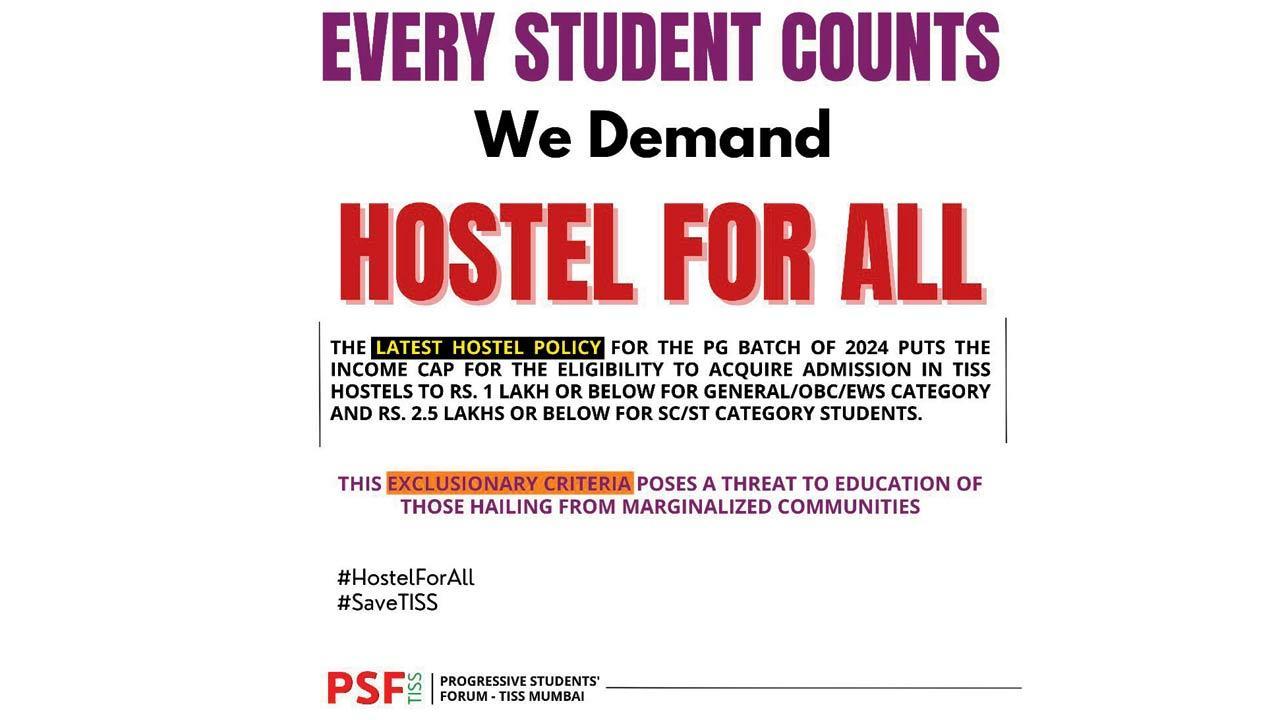TISS, which had introduced the income cap as an eligibility to avail hostel facilities after the pandemic, has now further reduced the limit for the first year post graduate batch

The students’ collective at TISS are demanding that the administration withdraw the latest hostel policy
Amid ongoing tensions between the students’ collective and the administration of Tata Institute of Social Sciences (TISS), a new issue has surfaced regarding the recently released hostel policy for the incoming first-year postgraduate (PG) batch. The Progressive Students Forum (PSF) has voiced strong disapproval, asserting that the administration’s new policy demonstrates lack of interest in extending welfare measures to maximum number of students.
According to PSF representatives, TISS is retreating from its primary responsibility of providing hostel facilities to all students, a crucial aspect for any public-funded educational institute. “The latest hostel policy released by the TISS administration for the incoming first-year PG batch reflects the administration’s utter disinterest in extending welfare measures for a large number of students,” stated a PSF spokesperson.
TISS changed post-COVID
PSF stated that before the COVID-19 pandemic, TISS provided almost all students with hostel accommodation, either on-campus or through off-campus facilities. “During that time, the institute also offered a shuttle bus service to assist students residing in off-campus hostels. However, post-pandemic, the administration ceased providing off-campus hostels and introduced an income cap on hostel facilities, which varied for first and second-year students,” the statement read.
For the year 2024 PG batch admissions, the income cap has been further reduced. First-year students from the OBC, EWS, and General categories must now have a family income of R1 lakh or below to qualify for hostel accommodation, while SC and ST candidates must have a family income of R2.5 lakh or below. The PSF emphasizes that Mumbai is an extremely expensive city, making it challenging for students to find affordable accommodation while supporting their education.
“At a time when TISS should be supporting all students by providing hostel accommodation, the institute is continuously withdrawing from this responsibility by reducing the scope under which students can apply for hostel accommodation. As a premier public-funded institute, TISS has a responsibility to enable students from marginalized and financially weaker backgrounds to pursue higher education,” said a representative of PSF.
In a plea for action, the PSF urged the TISS administration to broaden the scope of hostel availability. “PSF urges the TISS administration to extend the scope of hostel availability and provide a hostel for all students to apply the ideals of social justice that we study inside our classrooms,” a PSF spokesperson said.
As the new academic year approaches, the controversy surrounding TISS’s hostel policy continues to intensify, with many calling for a reevaluation of the policy to better support students in need. Student unions and collectives at TISS are already at odds with the administration over several issues, including demands to delink fee payment from semester registration and the removal of scrutiny in student-led academic events.
The newly released hostel policy has now become a major point of contention between the administration and the students’ union. The TISS administration could not be reached for comment.
 Subscribe today by clicking the link and stay updated with the latest news!" Click here!
Subscribe today by clicking the link and stay updated with the latest news!" Click here!








